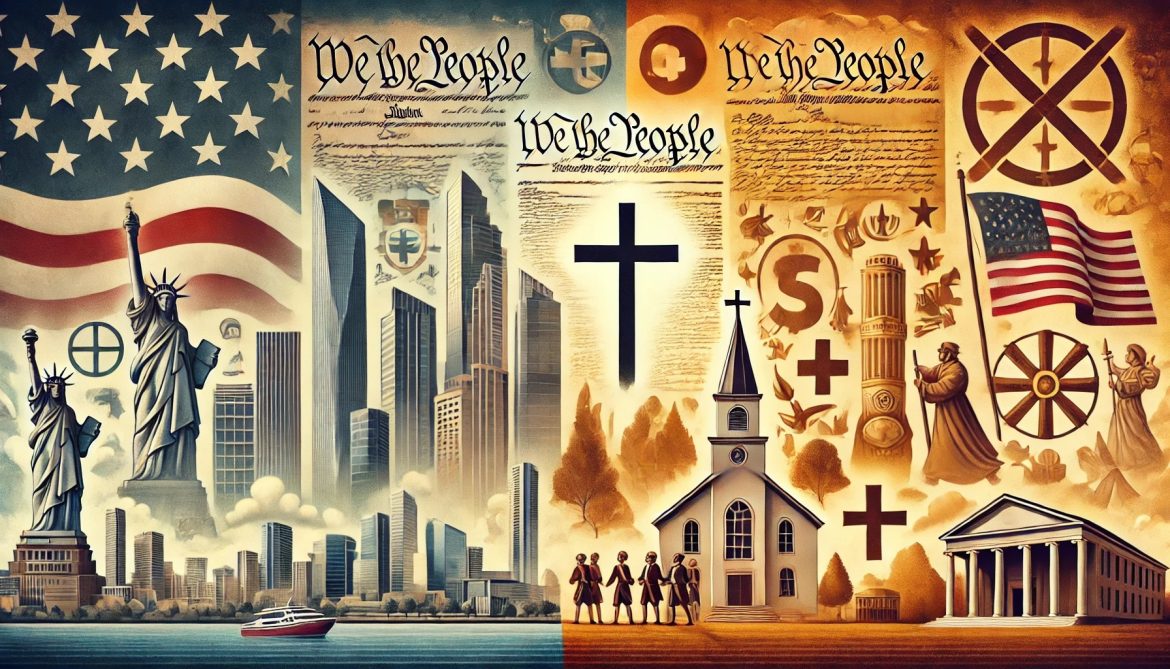Introduction: Debunking the Secular Interpretation of America’s Founding Documents
In response to a public comment stating that “our country was not founded on common law because the Declaration only refers to God four times, and the Constitution doesn’t refer to God at all,” Charlie Kirk offers a compelling counterargument. He explains how America was indeed founded as a Christian nation and why the current constitutional crisis stems from the fact that, while America is no longer a Christian nation, we still maintain a Christian government and Constitution.
Christian Nation pic.twitter.com/DQm32E5Xit
— Playteaux (@Playteaux1) August 16, 2024
The Religious Roots of State Constitutions
First and foremost, it is essential to understand that the original thirteen states were a collection of states and colonies with deeply religious foundations. Each of the thirteen states required a declaration of faith, with nine of the thirteen mandating Protestantism, except for Maryland, which was Catholic but still required a declaration of faith. Every single one of the original state constitutions, including Pennsylvania’s, contained provisions where individuals had to profess, “I profess Lord and Jesus Christ as my Lord and Savior.” Furthermore, fifty-five of the fifty-six signers of the Declaration of Independence were Bible-believing, church-attending Christians.
Common Law: A Christian Legacy
When discussing common law, it is crucial to recognize that it was inherited from William Blackstone, a devout Christian. Common law is an outgrowth of the scriptures, and its fundamental principles—such as the presumption of innocence, due process, and trial by a jury of peers—are rooted in biblical teachings. These principles are encapsulated in the broader biblical mandate for impartial justice, as found in Leviticus 19, which calls for justice to be blind to wealth or poverty. This concept is echoed in the New Testament’s ideal that all are equal in Jesus Christ, reinforcing that the idea of equality is fundamentally biblical, not derived from Enlightenment philosophy.
God in the Declaration of Independence: More Than a Mention
Some argue that God is mentioned only four times in the Declaration of Independence, downplaying its significance. However, this is far from trivial. The phrase “laws of nature and nature’s God” and the final paragraph of the Declaration, which reads as a prayer, are profound acknowledgments of divine authority. The Declaration appeals to the “Supreme Judge of the world,” a reference to Jesus Christ, who, according to Revelation, will judge the earth from His throne. Therefore, the Declaration was, in essence, a prayer directed specifically to Christ our Lord.
The Influence of Deuteronomy on America’s Founding
As highlighted in recent discussions, the Book of Deuteronomy was the most frequently quoted text during the founding era, surpassing even influential thinkers like John Locke, Montesquieu, and Blackstone. Deuteronomy, which outlines laws, customs, and traditions, served as a guide for the Founders as they crafted the Constitution. It was Moses’ farewell address, advising the Israelites on how to establish their government, which in turn influenced the development of American governance.
John Adams and the Necessity of a Moral and Religious People
Finally, consider the words of John Adams, who stated, “The Constitution was only written for a moral and religious people. It is wholly inadequate to the government of any other.” The American body politic was so deeply Christian and Protestant that the government’s form and structure were designed for a people who believed in Christ our Lord. The current constitutional crisis arises because America is no longer a Christian nation, yet we continue to operate under a Christian form of government. These are incompatible realities, and as Kirk argues, liberty cannot endure without a Christian population.
Conclusion: Understanding America’s Christian Heritage
The arguments presented by Charlie Kirk shed light on the profound Christian heritage of America. The current tensions within the constitutional framework highlight the growing disconnect between the nation’s Christian roots and its present-day secularism. Understanding this history is crucial for addressing the challenges that arise from this disparity. Dear God, have mercy, save America!




